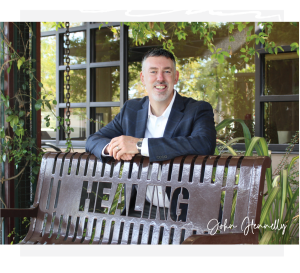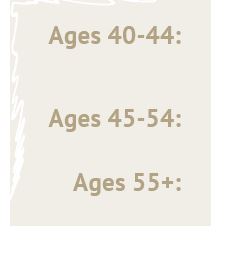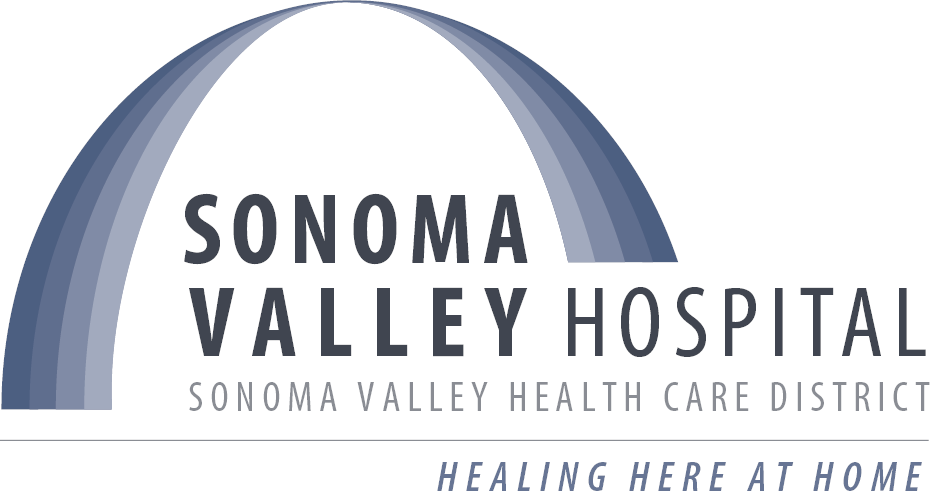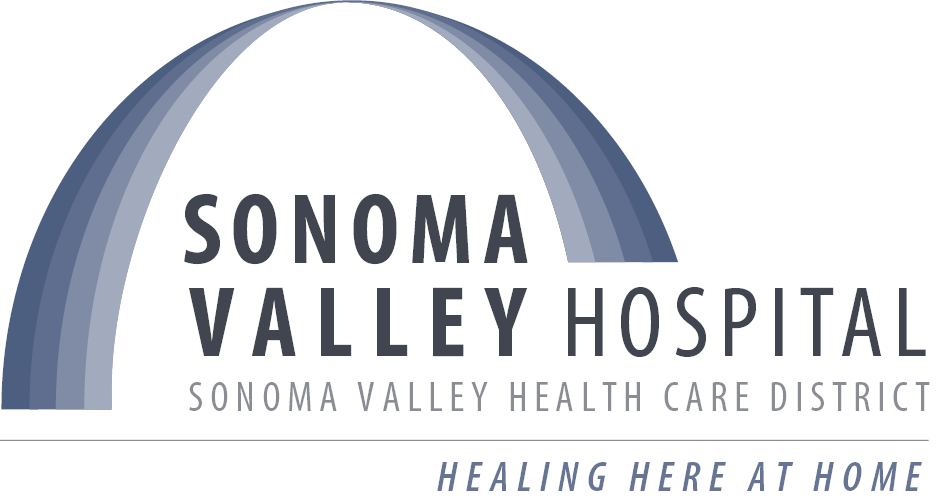
Dear Friends,
Welcome to Breast Health Month at Sonoma Valley Hospital (SVH)!
October is a dedicated time to celebrate and prioritize the well-being of women in our community and beyond. At SVH, we take immense pride in being a community institution where patient care and compassion stand as our guiding principles. As the CEO, it is both my privilege and honor to lead this close- knit team of dedicated professionals who are unwavering in their commitment to providing top-quality healthcare to our community.
Dr. Alexis, a valued member of our team at SVH, has emphasized our individualized approach. We are a team who genuinely cares about our patients. This Breast Health Month, we are thrilled to share with you valuable insights, expert perspectives, and heartfelt stories that reflect our unwavering dedication to breast health.
Month, we are thrilled to share with you valuable insights, expert perspectives, and heartfelt stories that reflect our unwavering dedication to breast health.
Throughout this month, we will delve into crucial topics, showcase the exceptional care provided by our team, and emphasize the strength that emanates from our close-knit community ties. Together, we will champion the cause of breast health, celebrating the resilience and well-being of our community and beyond.
We also want to take a moment to highlight how our affiliation with UCSF Health enhances our ability to support breast health. This partnership provides us with access to the latest technology and treatment options, allowing us to offer cutting-edge diagnostic services close to home. Services such as 3D mammography, ultrasound, X-rays, DEXA (bone density) scans, and CT scans are now readily available to women throughout the North Bay. In January we’ll introduce a 3 tesla MRI, something unique in a community hospital. This means better and more convenient healthcare for our community, and it’s a significant step forward in our commitment to women’s health.
Thank you for joining us on this journey of empowerment and awareness. I eagerly anticipate a month filled with meaningful conversations and the opportunity to make a positive difference in the lives of women in our community.
Warm regards,
John Hennelly
CEO, Sonoma Valley Hospital
……
 A Chat with Our Expert: Dr. Alexis Alexandridis on Breast Health and Surgery
A Chat with Our Expert: Dr. Alexis Alexandridis on Breast Health and Surgery
In a world where medical specialties are as diverse as the patients they serve, finding a true expert can sometimes be a daunting task. Dr. Alexis Alexandridis, a General Surgeon practicing in Sonoma, California, stands out as a seasoned professional with a unique perspective on breast health and surgery. Let’s dive into our conversation with Dr. Alexis to uncover her thoughts on breast health, early detection, and the role of women in community health.
A Journey into Surgery
Dr. Alexis Alexandridis always knew she wanted to pursue a career in medicine since high school. Initially leaning towards pediatrics, her journey took an exciting turn in medical school when she discovered her passion for surgery. She was drawn to the operating room by the camaraderie and teamwork it offered, relishing the opportunity to be part of a dedicated surgical team.
Her initial inclination was towards pediatric surgery, but she later realized that it wasn’t the right fit for her. Instead, she embarked on a diverse surgical path during her residency in rural southern Oregon, where she gained experience in a wide range of surgical procedures. She practiced for six years, sharing her knowledge with residents, before finding her way to Sonoma Valley Hospital (SVH) in 2017. At SVH, she revitalized breast surgery, and her practice now encompasses both general surgery and breast surgery.
A Unique Approach to Breast Health
When asked about what constitutes a great breast health program, Dr. Alexis emphasizes the importance of individualized care. Recognizing that each patient has unique biology and needs, she stresses the importance of avoiding unnecessary procedures. While early detection is valuable, Dr. Alexis suggests that patients should focus on self-awareness, becoming familiar with their own breast tissue and monitoring for any changes. Following guidelines as a tool, she encourages patients to start mammograms around age 40 or 45, depending on individual risk factors, and to develop a habit of preventative care.
The Role of Early Detection
Dr. Alexis acknowledges the societal emphasis on early detection but also points out that in reality, it doesn’t always result in significant changes. She believes that public awareness should shift towards encouraging self-awareness and preventative care, rather than solely relying on early detection as a panacea.
What Makes SVH Stand Out?
Sonoma Valley Hospital, where Dr. Alexis practices, stands out as a community institution that prioritizes patient care and compassion. The close-knit team of dedicated professionals at SVH is committed to providing top-quality healthcare. Dr. Alexis emphasizes that SVH may not have the vast resources of larger institutions but compensates with a personal touch and a team of staff members who genuinely care about their patients.
The Impact of Women’s Health on Community Health
Dr. Alexis highlights the pivotal role of women in maintaining the overall health of their communities. Women often serve as the driving force behind their families’ healthcare decisions, making them essential pillars of community health. However, she notes that breast cancer, as a diagnosis, has sometimes been co-opted by industries looking to profit from the pink ribbon movement, resulting in pinkwashing. Dr. Alexis challenges the simplistic notion that early mammograms can eliminate breast cancer risk and highlights the importance of addressing social and cultural factors that influence health disparities.
Dr. Alexis Alexandridis brings a unique perspective to breast health and surgery. Her commitment to individualized care, community health, and patient- centered medicine sets her and Sonoma Valley Hospital apart as valuable resources in the field of breast health. It’s clear that her passion for medicine and dedication to her patients are driving forces behind her contributions to the field.
Read more about Pinkwashing
……
Project Pink
Celebrate Breast Health Month with Project Pink!
Project Pink, proudly supported by the Sonoma Valley Hospital Foundation, is here to ensure the well-being of Sonoma Valley women. We offer no-cost mammogram screenings year-round to uninsured and underinsured women aged 40 and above, right here at Sonoma Valley Hospital.
Our program, made possible through a special grant, is a community service designed to empower women with vital healthcare. We employ the Hospital’s state-of-the-art 3D Mammography System for enhanced accuracy, putting your health first.
Executive Director of Sonoma Valley Hospital Foundation, Dave Pier, expressed our commitment to women’s health, saying, “The Foundation is dedicated to providing access to mammograms and cancer screening care. Project Pink’s success is a testament to our community’s generosity in funding these crucial diagnostic services.”
You are eligible for Project Pink if you:
- Are 40 years or older. • Have not had a mammogram within the past 12 months.
- Live or work in Sonoma Valley. • Face affordability challenges due to being uninsured, underinsured, or having a high deductible.
To participate:
- Obtain an order from your physician (fax it to Sonoma Valley Hospital at 707.935.5271).
- If you don’t have a physician, contact the Mammography Department at 707.935.5215 for assistance.
- Call 707.935.5215 to schedule your appointment, mentioning that you want to be part of Project Pink.
Our bilingual support staff is here to assist you every step of the way. Prioritize your health this Women’s Health Month with Project Pink!
……
Over the Counter Birth Control
The recent FDA approval of over-the-counter birth control is a significant stride in the ongoing battle for reproductive health and autonomy. In early 2024, the U.S. will make history by offering the first birth control pill for over-the-counter use, aligning with over 100 other countries worldwide that already allow prescription-free access to birth control.
To delve deeper into this transformative development, we invite you to listen to the full interview here, featuring insights from Dr. Mai Fleming, Assistant Clinical Professor in Family and Community Medicine at UCSF. Dr. Fleming sheds light on the structural benefits this change brings, particularly for marginalized communities, people of color, and young individuals.
……
Facts and Figures
Screening Recommendations
Guidelines for mammogram screening for an average-risk woman, from the American Society of Breast Surgeons)
 Ages 40-44: Discussion with her physician or healthcare provider to consider screening mammography based on a balanced conversation regarding the benefits and risks of mammography.
Ages 40-44: Discussion with her physician or healthcare provider to consider screening mammography based on a balanced conversation regarding the benefits and risks of mammography.
Ages 45-54: Yearly screening.
Ages 55+: Yearly or every other year screening based on a shared decision-making discussion with their physician or healthcare provider regarding their benefits and risks of screening timing.
Mark Your Calendar! Schedule mammograms as per the recommended guidelines. Consult with your healthcare provider for personalized recommendations.
……
RESOURCES
Breast Cancer Screening 101 – https://breast360.org/topic/2017/01/01/breast-cancer-screening-101/
Breast Health – Frequently Asked Questions – https://breast360.org/topic/category/faq/
Breast Density and BMI Both Play a Role in Breast Cancer Risk
A more nuanced approach is recommended to avoid inequitable screening notification of breast density among racial and ethnic groups. By Elizabeth Fernandez
OTC Birth Control Makes Great Strides in Reproductive Health Battle (audacy.com)
As the fight for reproductive health and bodily autonomy continues, the Food and Drug Administration recently approved the first birth control pill for over-the-counter use, which will be available in early 2024.To tell us more about this, KCBS Radio’s Alice Wertz spoke with Dr. Mai Fleming, Assistant Clinical Professor in Family and Community Medicine at UCSF.
As Prescribed: Is There a More Effective Way to Detect Breast Cancer than Annual Screening? (audacy.com)
Methods for detection and treatment of breast cancer are changing, as medical experts say the illness is not just one disease and should not be classified as one. To discuss this, Dr. Laura Esserman, the executive director of the UCSF Breast Care Center and principal investigator for the WISDOM Study, and Allison Fiscalini, the WISDOM Study executive director, join KCBS Radio reporter Alice Wertz.


